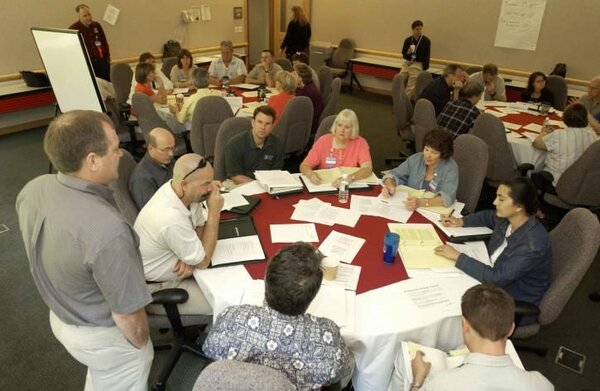Delphi Technique
The Delphi technique is a structured survey technique for decision-making that draws on the knowledge and assessments of multiple experts. It is particularly well-suited to complex or ambiguous issues where clear data may not be available. Over several rounds of questioning, anonymised responses are collected, analysed and fed back to the participants. Through this iterative process, a well-informed consensus can be reached.
Organisation
-
Duration
Long (more than 1 hour)
-
Complexity
Difficult
-
Group size
15 to 25 persons
This activity is suitable online.
Description Long
The Delphi technique is a widely used and recognised method that brings together real-world knowledge from experts. Developed in the 1950s by Olaf Helmer and Norman Dalkey, it is based on the principle that the collective knowledge of many is more valuable than that of an individual.
The method relies on a structured, multi-stage survey process in which experts anonymously provide their assessments. A typical Delphi process consists of three to four iterative rounds, with each questionnaire building on the results of the previous round. These results are compiled and shared with participants. In subsequent rounds, participants may revise their responses in light of the collective feedback. The anonymity of the questionnaires ensures that opinions are considered without bias or judgement.
Illustration

Preparation
- Prepare and test a questionnaire.
- Provide clear, written instructions.
Execution
1st round – Initial Expert Survey:
- Experts receive a first questionnaire with questions relating to a specific problem.
- Responses are collected, anonymised, and analysed.
2nd round – Consolidation and Evaluation:
- The anonymised answers are grouped into categories or thematic clusters.
- Experts receive a summary of the first round and are asked to prioritise or evaluate the responses.
3rd round – Consensus Building:
- The results of the second round are shared with the participants.
- Experts have the opportunity to reconsider their views and, if necessary, revise their responses.
4th round – Final Deliberation (optional):
- If significant differences of opinion remain, a final evaluation round is conducted.
- The final results are documented and used as a basis for decision-making.
Hints from experience
- The Delphi technique can be conducted using both qualitative and quantitative approaches. The questionnaires may include open-ended questions. The process is repeated until a level of agreement is reached – typically three to five rounds.
- Not every Delphi outcome has to result in complete consensus; a well-documented divergence of opinion can also be valuable.
- If the Delphi technique is conducted online, tools such as Google Forms, Typeform, or specialised Delphi platforms can be used.
References
Hsu, C. C., & Sandford, B. A. (2007). The Delphi technique: making sense of consensus. Practical Assessment, Research & Evaluation, 12(10), 1-8.
Linstone, H. A., & Turoff, M. (Eds.). (1975). The Delphi method: Techniques and applications (Vol. 29). Reading, MA: Addison-Wesley. Retrieved from, http://is.njit.edu/pubs/delphibook/delphibook.pdf
Somerville, J. A. (2007). Critical factors affecting the meaningful assessment of student learning outcomes: A Delphi study of the opinions of community college personnel. Unpublished doctoral dissertation, Oregon State University, Corvallis, OR.